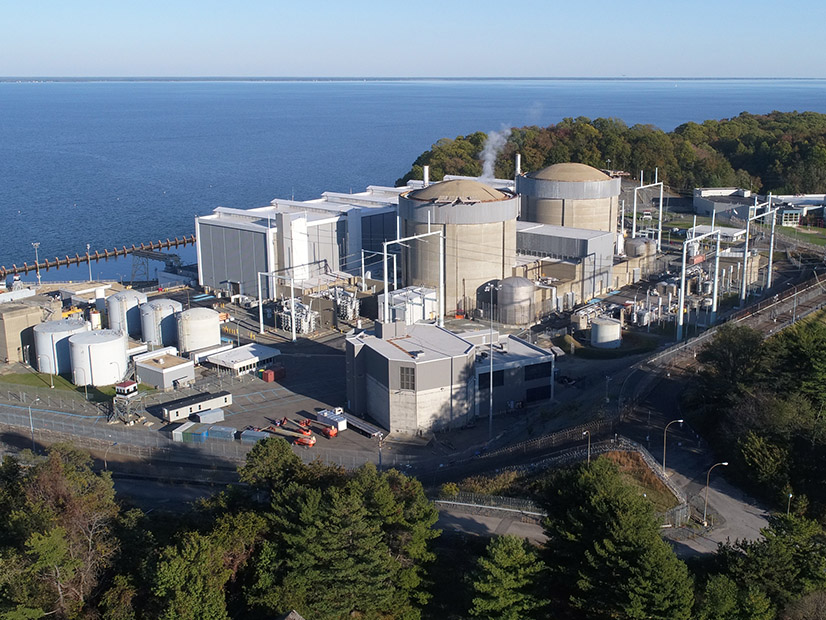Constellation Energy turned in another solid quarterly report Aug. 6, boosting its earnings guidance for the year and offering a rosy picture for the future of its nuclear power fleet.
During a conference call with financial analysts, much of the conversation surrounded data centers and the prospect of Constellation helping to meet their immense load demand with long-term behind-the-meter supply agreements.
CEO Joe Dominguez said the company is moving ahead with negotiations for co-located data centers even as the regulatory structure for such agreements is examined.
He presented this as a win-win-win — helping to place the nation at the forefront of the artificial intelligence revolution, reducing the amount of new infrastructure utility ratepayers must fund and locking in a market for Constellation’s zero-emissions generation for decades to come.
“We’re confident that any thorough examination of co-location with nuclear plants will show that it is both the fastest and most cost-effective way to develop critical digital infrastructure without burdening other customers with expensive upgrades,” he said.
Long-term behind-the-meter agreements also give Constellation the economic certainty it needs to seek relicensing of its plants, Dominguez said.
The issue has gained prominence as Talen Energy has proposed a deal to power a growing data center on the site of its nuclear plant in Pennsylvania, drawing protests from Exelon and American Electric Power, which drew rebuttals from Talen and others, including Constellation. (See Talen Energy Deal with Data Center Leads to Cost Shifting Debate at FERC.)
On Aug. 2, FERC said it would hold a commissioner-led technical conference this year on co-location of large loads at generating facilities (AD24-11).
Dominguez said the Aug. 2 actions at FERC “may have slowed things but ultimately will be constructive, in our view. Notably, FERC did not grant requests by a small number of utilities to set the Talen Energy ISA for hearing or in the alternative to reject it outright.”
Co-location is not always the right solution, but neither is it a new or unfamiliar concept, he added.
“As we see it, utility connection will continue to make sense for some applications and in some parts of the grid. But when it’s an option, we will continue to see customer interest in co-location, strong interest, because there are just too many advantages of connecting large load directly to large forms of generation, especially clean generation.”
The protest to FERC about the Talen deal may slow the finalizing of facility co-location agreements or change their details, but it will not block co-location, Dominguez said.
“We really don’t see an outcome here where the FERC is going to say, ‘You can’t do this.’”
An analyst asked if the recent PJM auction increased a sense of urgency among potential customers to lock down these co-location agreements. (See PJM Capacity Prices Spike 10-fold in 2025/26 Auction.)
Dominguez said it did, just as it has increased the urgency for front-of-meter deals, because the marketplace is tightening.
Another analyst asked whether Constellation expected to get regulatory clarity on the prospect of co-location this year or next.
Dominguez did not offer a prediction but said Constellation is not waiting for absolute clarity in the FERC process.
“I do think the Talen ISA is going to be instructive, and folks are watching that, to make sure it goes through, what conditions might get attached to that, but we independently are working on contractual provisions that allow us to manage whatever outcome comes out of those proceedings.”
He added: “So, at least for the moment, we’re working with our customers [toward] finalizing deals.”
Customers and policymakers have an interest in resolution of the dispute, Dominguez said.
“Talen’s not our deal, but I’ll use it as an illustration: That arrangement is bringing $10-plus billion, maybe more than $20 billion, of economic development to a region that if we’re going to be honest, hasn’t seen a lot of sunshine from an economic development standpoint of this dimension in a long, long time.
“I think it’s fair to say that policymakers around Pennsylvania like to see that for communities like this that need jobs and economic opportunities. And I think it’s fair to extrapolate from that, that they won’t like it very much if people interfere with those things and cause it to come off the rails.”
Constellation reported second-quarter GAAP net income of $814 million ($2.58/share), compared with $833 million ($2.56/share) in the same quarter of 2023.
The company raised its full-year 2024 net earnings guidance from $7.23 to $8.03/share to $7.60 to $8.40/share and maintained its earlier forecast of annual earnings growth greater than 10% on average through 2028.
Constellation’s stock price closed 6.5% higher in heavier-than-average trading Aug. 6.




